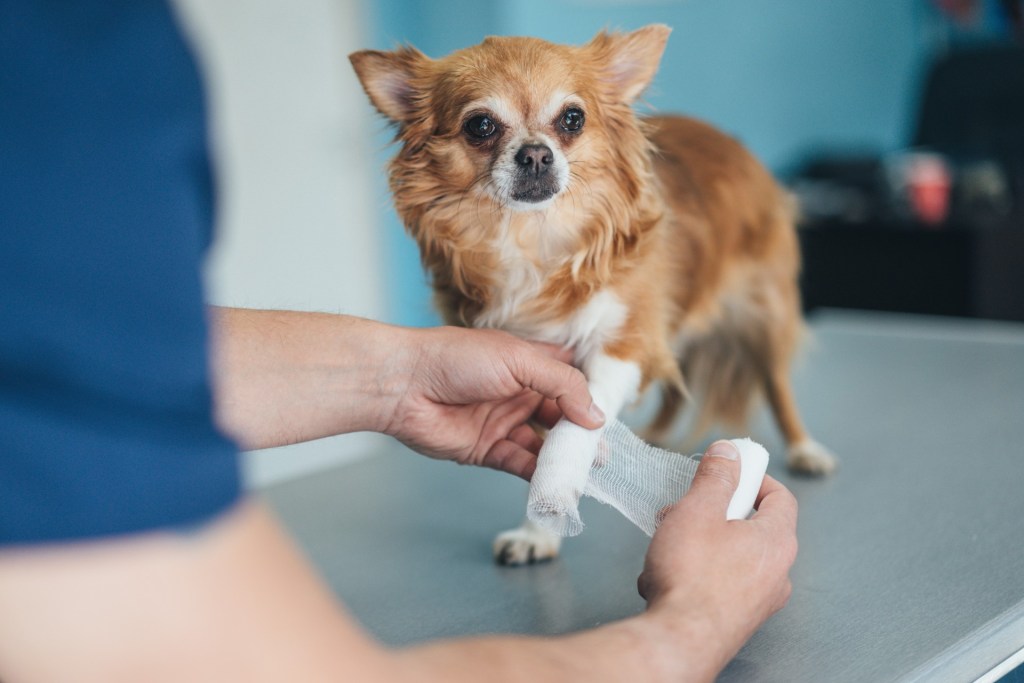Did your dog have a recent surgery or injury and appears to be in pain? Have you run out of their prescribed pain medication? You might be wondering “What can I give a dog for pain?” or “Can dogs take Advil?” We have the answer to those questions and more in this helpful article. Keep reading to find out about giving human pain medicine to dogs.

Human prescription painkillers and dogs
First of all, never give your dog your prescription painkillers. Many active ingredients in human pain medicines, such as opiates, are very toxic to dogs and can even kill them. This is because opiates have pronounced effects on the central nervous system and can really slow things down in the body. Only a small dose of opiates is needed to kill a dog.
It is a bad idea to share your prescriptions with another human, let alone a dog. Opiates should only be given to a dog as prescribed by and under the supervision of a veterinarian.
Advil, Tylenol, and other over-the-counter medications for dogs
Just like prescriptions for humans, many over-the-counter medicines that humans take are unsafe for dogs. Tylenol (acetaminophen), a fever reducer, along with Advil (ibuprofen) and other non-steroidal, anti-inflammatory drugs (NSAIDs) are commonly used by humans to treat pain and aches. However, according to the American Society for the Prevention of Cruelty to Animals (ASPCA), both ibuprofen and acetaminophen are in the top 10 leading causes of poisonings in dogs and cats.
To know why this is, it is important to know how drugs similar to ibuprofen, including Aleve (naproxen) and aspirin, work. All of those drugs are NSAIDs, which function in the body by preventing an enzyme called cyclooxygenase from working. Cyclooxygenase is necessary for the production of prostaglandins, which are molecules that contribute to inflammation and pain.
Prostaglandins have other roles in the body, too, including maintaining blood flow to the kidneys and protecting the lining of the digestive tract.
An NSAID overdose usually results in impaired kidney and gastrointestinal functions. In humans, an overdose of an NSAID requires a relatively high dose, but dogs metabolize these drugs differently, so a much lower dose is required for them to overdose. In severe cases, an NSAID overdose can lead to acute renal (kidney) failure, seizures, coma, and death in dogs. So, don’t give your dog an NSAID, acetaminophen, or any other over-the-counter medication unless directed to by your veterinarian.
How to treat pain in dogs
Now you might be curious as to what exactly your dog can take to alleviate pain. While human medications are out of the question, that still leaves many drugs used in veterinary medicine available.
NSAIDs are prescribed to dogs for mild to moderate pain associated with arthritis or a minor injury. Some NSAIDs that are approved for use in dogs have been specially designed just for that, as they leave the non-inflammatory properties of prostaglandins intact. This means that renal and gastrointestinal side effects are less common. These compounds include deracoxib, carprofen, and meloxicam. All of these drugs can only be dispensed under the supervision of a licensed veterinarian.
So, if your dog is in pain, a trip to the vet may be in order. However, note that even when prescribed, your dog may react to an NSAID negatively. While your dog is taking an NSAID, be sure to look for side effects such as vomiting, diarrhea, poor appetite, or lethargy.
If you notice any of these, give your vet a call or visit as soon as possible. To help prevent further injury from an NSAID overdose, always double check the prescription instructions before giving your dog any medication. Your dog should not be taking two NSAIDs at once or an NSAID in combination with a corticosteroid.
For more severe or chronic pain in dogs, non-NSAID drugs may be prescribed. These include gabapentin, which works by soothing damaged nerves; and tramadol, a mild opiate that reduces sensations of pain. Amantadine, which blocks a pain pathway in the nervous system, is another painkiller that is sometimes given to dogs.

You should not give Advil, Tylenol, or any other human medication to your dog. Only give them drugs that have been prescribed by and discussed with a veterinarian. Following these guidelines will lead to a happy, pain-free dog and the avoidance of a vet trip for you.
Editors' Recommendations
- Are ‘dog years’ really 7 human years? How to calculate your dog’s age
- Why does my dog have a bald patch on their tail? Here are the answers you need
- Looking for signs your dog has ticks? These telltale symptoms mean you have a flea or tick problem
- Xylitol is dangerous for dogs: 10 surprising products that contain it as a hidden ingredient
- Is your dog barking nonstop? Here’s how to get your noisy pup under control



